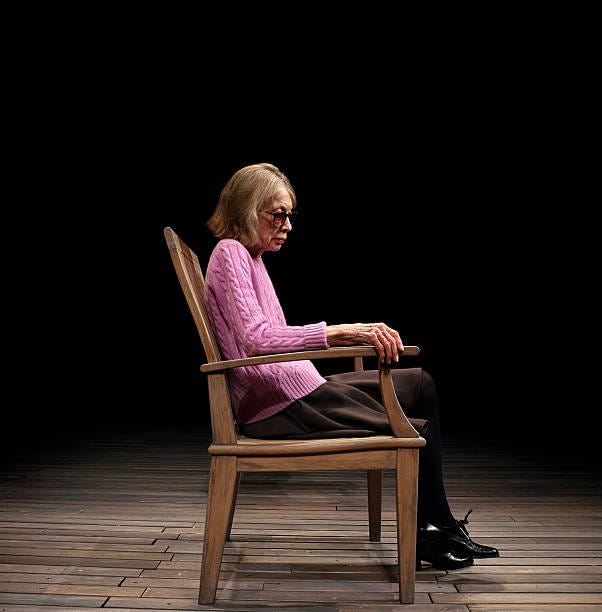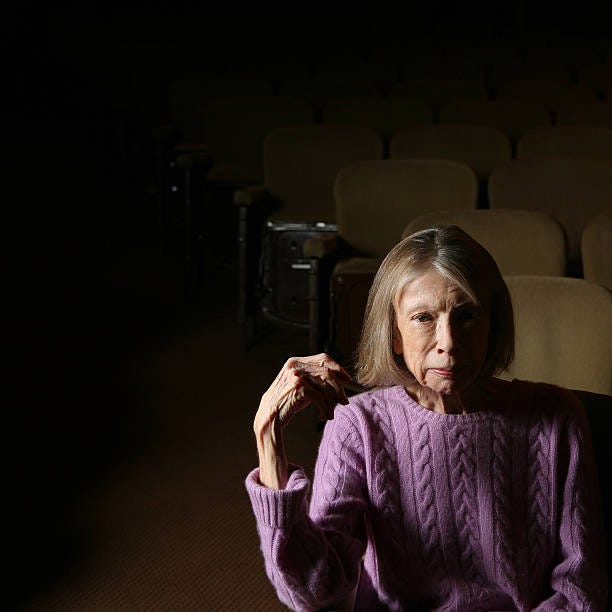Joan Didion: The Mental Weeds
“No one is looking around at people and things and taking note and taking temperatures. The comedy is the subsequent surprise. Always the surprise."
My friend Lili Anolik is enjoying deserved acclaim for her dual biography Didion & Babitz, and it keeps bringing me to what drew us into conversation many months ago: Joan Didion and her odd relationship with me.
There has been and will certainly continue to be controversy surrounding Joan Didion. She invited the controversy, and actually often enjoyed it, and as both Mart Crowley and I witnessed, much of the anger that was displayed in responses and reviews by Didion’s husband John Gregory Dunne emanated from this small, seemingly fragile woman. “What they had,” Patricia Bosworth told me, “was a hell of a ventriloquist routine.” Dunne’s responses to hatchet pieces written by Barbara Grizzutti Harrison and John Lahr were uttered by Didion, and Bosworth was present to hear them uttered. “That little voice of Joan’s,” Bosworth said, “and then it roared from the pen of her husband.”
Here is how I met Joan Didion. In 1993 I was hired to manage Ecce Panis, a bakery affiliated with The Sign of the Dove restaurant. There were two branches: One on Third and 65th, next to the restaurant, another on Madison and 90th. Didion arrived to the Madison branch one day anxious and out of breath: Please, she implored, tell me you have an Herbed Fougasse. I had been notified that a thin, anxious, impatient woman was headed my way for a Fougasse, so I had pulled them from the shelves. I should note that “thin, anxious, impatient woman” described the majority of customers to Ecce Panis. I was not expecting Joan Didion. She was grateful. I had “saved” her dinner party. For the next few weeks, Joan Didion called me to request that I hold a Fougasse or a Pepper Brioche or a Chocolate Bread or a Neo-Tuscan loaf, and I would put them aside. We talked about food. A lot. We shared recipes. She made me a panzanella. I gave her a jar of Olive Salad from the Central Market in New Orleans.
On one of the visits to Ecce Panis, Didion saw me speaking to the actress Lois Smith, who was in the shop to pick up items to take to a visit with her good friend Donald Windham, a wonderful writer and a great source to me on writing about Tennessee Williams, with whom he had both a personal and a working relationship. Didion knew and admired Lois Smith. I introduced the two women. They spoke. Didion complimented Smith, and Smith returned the favor. When Lois left the shop, Didion gave me a look and asked, “Okay, who are you?” When I told her I was a writer, not just the bakery manager, she was interested. When I told her I was writing about Tennessee Williams, and he had spoken of her, she was intrigued. When I showed her what he had said, she invited me to dinner at Coco Pazzo and we began to talk about writing. Joan Didion and I would have our odd relationship until 2016, but I cannot say that we were friends. I am sure that she would agree with me, because, in 2009, at the premiere of Nora Ephron’s Julie & Julia, Didion, accompanied by Lynn Nesbit, introduced me to a woman as “a man who has worked for me through the years.”
That is true. After Ecce Panis, there was the Hotel Carlyle, then Amy’s Bread. Didion always sought me out, we always talked. However, I was, primarily, an employee.
*****
I’ve been thinking about Didion quite a bit lately, because I wish she were here now to look about and cast her opinions about the world today, America today. Back in 1993 and 1994, she was speaking of the “decay” and the “distance” of Bill Clinton and the Democratic Party. I never could forget that I was talking to a Goldwater Girl who held strong conservative beliefs. I was not then—nor am I now—a listener of AM radio, so when Didion referred to “symbolism over substance” to describe the Clintons, the “Year of the Woman,” and the aborted attempts to introduce healthcare reform or to allow gays in the military, I assumed the phrase was hers, and might soon appear in one of her pieces. However, the phrase was from Rush Limbaugh. This shocked me. Didion quickly disavowed much of what Limbaugh espoused, but she said something I never forgot: “He is not to be admired so much as heeded. He’s on to something. We ignore it at our peril.” Was she wrong? What would she say abut our political climate today? Didion titled one of her collections Political Fictions, and that is how she saw them. Rubrics for the hoi-polloi. Fortune cookies for the harried. Myths to munch on. Symbolism over substance.
“No one is thinking,” she told me. “No one is looking around at people and things and taking note and taking temperatures. The comedy is the subsequent surprise. Always the surprise. I want the results they claim to seek, but they are seeking affirmation, applause. They are not seeking results. Results take time and dedication, and the results they seek—caring for citizens; securing rights for women—are not endorsed by the people who write the checks and host the parties, where funds and social profiles are raised.” When Joan Didion said this in 1994, near the actress Lois Smith, she elicited shudders and sympathy. Reactions to this statement are not so hostile today.
*****
It is safe to say that many are surprised, put out of balance by certain outcomes, and in the “healing,” the “learning process,” the “teachable moments” called for in this confused time, it has been said that what we lack is “community.” Look around for a definition of “community,” and you get fistfuls of hyperbole, the largest of word salads. What it appears we want most today is community, but without all those horrible people out there in the world. Without any effort or pretense. I remember a friend saying that her book club had “saved” her. “I might never have left the house,” she told me. She appeared grateful, appeased. In less than three weeks, she had opted out—a stomach condition, an air conditioner on the fritz—but it was really because she could not bear the stupid responses her fellow members made about Katherine Anne Porter, and a request to bring a covered dish was the final straw. “It got punitive,” she said. She reads at home, alone. “People have just become too much trouble.”
“It is when we are alone,” Didion told me in 2007, “that the mental weeds grow stronger and start to choke out the air.” Wow. What was going on then? I know that Joan Didion had called me to request the unpublished telephone number of Marian Seldes, the actress who was a close friend of mine. As Didion put it, Marian had “saved” her on the opening night of her play The Year of Magical Thinking. Nervous and exhausted, Didion saw the sympathetic eyes of Marian Seldes and leaned into her height. Marian told me that Didion sought her out as a frightened pet might, and Marian did not mind. Marian never minded fulfilling the needs of others. Didion called me for Marian’s number because “I might need her again. I’m alone too much.” Then the comment about the mind and the weeds.
Marian took her call. Marian never revealed what Didion said to her, but Didion revealed what she asked of her. Didion asked if a requirement for working among theater people was to be in a state of “determined self-retardation.” It could not have been pleasant for Seldes, who was preternaturally devoted to the theatre, could not bear to hear anything negative about it, but what she told Didion was this: “I think we generate what we believe. I think we have to have faith in others, and they rise toward this faith. There are stupid, greedy, untalented people in the theatre. They are also in the department stores and the banks. We have to believe.”
Didion’s reply: “I do not have that gift.”
However, she kept calling Seldes to see if it could be shared.
I wonder what Marian Seldes would think of our theatre today. The consistent badness of the plays; the brash, brainless musicals, geared more for Branson, Missouri, or Las Vegas than the alleged sophistication of “Broadway,” whatever that word means now. A friend I adore was supine in her grief over the recent election and what she called the “failure of our institutions” to do the right thing, report the facts. I cannot sympathize with someone who canceled her subscriptions to the Washington Post and the Los Angeles Times for “dereliction of duty” but still subscribes to the Manhattan Theater Club, the Roundabout, and the Public Theater, even though she most often returns from their offerings as slugged and as depressed as she was when those newspapers failed to endorse Kamala Harris. Marian Seldes would say—and did say—that we hold on to certain failures because, like bad children—damaged goods—we pray that they will get better. We want to be present when they awake from the fever. We want to have a hot meal ready when they stumble home from the woods.
“She can lie as well as I can,” Didion said to me about Marian Seldes. “We lie about different things. I rearrange words until the story makes sense, and she rearranges facts until she can believe again. I find comfort with her.”
*****
We enter a contract when we agree to trust. When we submit. Submission is required. The faith that is required—and which is so difficult—requires that we withhold judgment, disbelief. Didion said “we fall into trust as we are supposed to fall in love.” But Didion did not fall in love. This she revealed to us over and over. This was uncovered by Lili Anolik in her study of the writer. Didion confessed that trust was impossible for her. This is a writer who was aware of the snake beneath the rock, the killer in the hedges, the poison in the yard where the puppy has gone to gambol, the tests results that will end everything. Everything happens or changes in an instant, she warned us. What she believed—what she had an overwhelming faith in—was that the frightening things would happen. “My faith,” she told Marian Seldes, “is in the darkness.”
A memory Didion could not release: A child abandoned by her mother on a highway median. The rush of traffic. How many hours and how many men did it take to pry the fingers of the little girl from the fence she clutched in terror? Where is that little girl now? “I think of that little girl a lot,” Didion told me. “I think she’s around. A version of her. She lives and walks among us. I can’t forget her.” Did Didion think we were surrounded by abandoned, terrified people? “I think most people are terribly lost,” she answered. “I think most people are on the edge.”
Marian Seldes asked Joan Didion, in the summer of 2007, if she took joy in anything. I know because Joan called me and said that Marian was “really into” joy. What is joy? Didion wanted to know. I had no answer. It becomes harder and harder to define or to find joy. It slips away, mercury in the palm.
“I don’t know about joy,” Didion told me, “but I find purpose in order. I pursue order. Order provides—I don’t know—comfort. Satisfaction. Wrestling a sentence is for me what seeing a good play is for Marian. I can’t understand something until I think and write about it. Punching words around. Tennessee said that Truman Capote threw words up in the air like confetti, and that image gives me a headache. It’s like too much candy too soon. I think Tennessee was talking about the effect of the writing, which is never like throwing confetti in the air. Writing is hard work. It’s intimidating, and I think the early Capote really threw words down on a mat and forced them into position. I think the later work was lazy. He really might have been throwing words up in the air and seeing where they drifted, landed, stuck. My words are too heavy for me to throw. Words into place, thoughts into place. The control of words; the control of thoughts. Those weeds. What are some definitions of joy you’ve found?”
Found?
“Yes,” he replied. “When you talk to all these people. I saw you with Mike [Nichols]. What does he think joy is? Or Lois Smith? Did Tennessee Williams know joy?”
“I think sometimes, he did,” I told her. “But he had what he called a failure of faith. So do I.”
“So do I,” Didion said. “I could never do those long prayers or light candles or visit psychics or look for signs. I think the signs are all around, and the signs are clear. If you look. The signs are frightening, so we cloak them with myth—a prayer, a wish list, a curse. A visit with a shaman. Do me a favor.”
What? I asked.
“Write a list of signs you see now. Will you?”
I was her employee.
TO BE CONTINUED…





